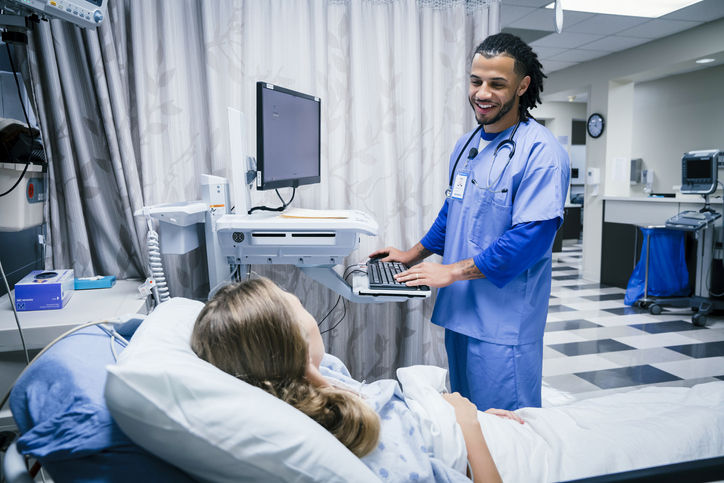
With the Rise of AI, What IP Disputes in Healthcare Are Likely to Emerge?
Munck Wilson Mandala Partner Greg Howison shared his perspective on some of the legal ramifications around AI, IP, connected devices and the data they generate, in response to emailed questions.
This year, one-quarter of the 24 cohort companies are from the Silicon Valley, a stat that pleases Erik Halvorsen, the director of the TMC Innovation Institute.
“That they are coming to Houston, with the largest medical center in the country, and expect to get something out of it, that says something,” Halvorsen said in a phone interview. “We also had our highest number of international applicants, a huge diversity of products and geography of the founders, the high percentage of women founders — it speaks to the visibility of our program.”
The accelerator doesn’t go in for the trappings of traditional models, which there seems to be fewer of these days. There is no flat disbursement in exchange for equity.
Halvorsen noted that the venture fund functions as a carrot for companies that make decent progress and get good traction. These are the companies that will have a much greater chance of accessing that capital, he said.
Clinical decision support tools dominate the cohort alongside those that seek to improve the patient experience. The descriptions of the companies were obtained from a Texas Medical Center release and the companies’ websites.
Agathos, cofounded by Andrew Trees and Steve Waye in San Francisco, is designed to offer physicians guidance on how they can be more efficient based on their own data regarding factors such as discharge rates and consult rates.
Deep 6 AI (Pasadena, California) Uses artificial intelligence on clinical data to increase the quantity of and find better-matched patients for clinical trials in minutes instead of months.
Luminare Sarma Velamuri, a graduate of Baylor College of Medicine and based in Houston, developed an anti-sepsis software as a service aimed at decreasing mortality, cost, and length of hospitalization.
ScalaMed Tal Rapke founded the Australian health technology business that developed a blockchain tool for protecting patient data while making reconciling medicines easier.
Strados Labs The idea behind the remote patient monitoring company sprang from a healthcare hackathon sponsored by Jefferson Health and Independence Blue Cross in Philadelphia. Nick Delmonico, the founder and CEO, teamed up with physician and engineer Yu Kan Au and Tanziyah Muqeem, to manage chronic respiratory conditions. It developed a continuous breathing sensor that helps connect doctors to their asthma and COPD patients.
Trayt is a data collection and analytics company based in Redwood City, California. Its goal is to improve diagnosis, treatment and the patient experience for patients with autism, ADHD, and other neurological conditions. Malekeh Amini, CEO, cofounded the business with Chief Medical Officer Carl Feinstein, a clinical professor of psychiatry at the UC Riverside School of Medicine. Amini previously worked as senior vice president and products at Genophen.
Trusted Health Matt Pierce is the founder and CEO of the San Francisco business, which developed a program to match registered nurses with flexible nursing jobs at employers.
Other companies include:
Abaka Health (San Francisco) Founded by Arman Ozgun, Dave Markert, and Ajay Patel, the business seeks to support providers in creating a better patient experience by bringing together the clinical and financial aspects of healthcare.
b.well (Baltimore) Empowers consumers by aggregating their healthcare data by providing incentivized care coordination, along with concierge and matching services.
DermaSensor (Miami) Connected device that enables healthcare professionals and patients to efficiently check for skin cancer by leveraging cutting-edge technologies.
Etyon Health (Chicago) Artificial intelligence-enabled products and services that help health care leaders identify, improve and manage financial and patient outcomes faster and at a lower cost.
Evidence Care (Nashville, Tennessee) Clinical decision support tool that allows providers to access evidence- based treatment recommendations that are patient-focused, enhance the shared decision-making process and accelerate their EHR workflow.
Gain Life (Boston) Digital platform that uses personalized and adaptive behavior change programs to engage individuals in achieving better outcomes.
Klikkit (Denmark) Smart button and application that monitors, analyzes and improves habits and behaviors.
Mahmee (Los Angeles) Comprehensive healthcare ecosystem that enables practice management collaboration between maternity, infant care practitioners and large health systems.
NarrativeDx (Austin) Artificial intelligence platform designed to identify actionable insights from patient feedback to improve CAHPS scores, increase referrals and reduce nurse turnover.
ORIntel (Houston) Hardware and software solution that provides operational support and real-time operating room (OR) status to deliver a more cost-effective surgical suite to staff and patients.
Particle Health (New York) Founded by Troy Bannister, the company developed a blockchain program that incentivizes health organizations to start sharing data in a decentralized, segmented and highly granular way.
Patients We Share (Houston) Workflow communication application which uses machine learning to foster connectivity within the healthcare ecosystem, aligning patients with the most appropriate providers, products and services.
Revealix (Austin) Innovative medical imaging software service designed to pioneer early discovery of diabetic limb complications, which is non-invasive, mobile and at the point-of-care.
ScalaMed (Australia) ? Next-generation blockchain solution for democratizing a patient’s healthcare data and creating an online market for medications.
SenceTech (Austin) Autonomous, continuous monitoring electrocardiogram and heart rate variability bracelet that uses a proprietary ECG/HRV cloud-based interpretation platform.
Softcare Studios (Italy) Immersive virtual-reality experience aimed at improving the well-being of patients undergoing painful and anxiety-provoking procedures during therapy.
Sunrise Health (Boston) Text-based group support for behavioral health patients that utilizes artificial intelligence tools to increase provider capacity and catch complications early.
Well Health (Santa Barbara, Calif.) An intuitive two-way texting platform for front offices and patients that eliminates phone tag and improves the health care experience.













